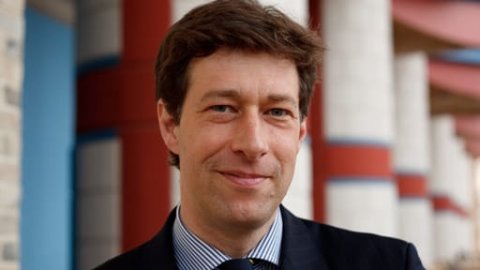July 2021 - Dr Simon Learmount
The Coronavirus pandemic has brought about change in numerous ways, and whilst many of its effects have been catastrophic and severe it has also afforded us all the opportunity to re-think ways of working and connecting to one another. The Corporate Partnership Programme was paused during the early stages of the pandemic while our partners ‘pivoted’ to new modes of working, Fellows adjusted to online teaching and remote research and professional staff became proficient at juggling home-working with home-schooling. We resumed the full-range of activities once our partners settled down into new routines, the realisation dawned that home-working was to become the long-haul, and once we had all fully acclimatised to the new virtual reality. But we quickly realised that the new normal contained possibilities that the old world did not – so this month we decided to convene, for the first time, all of our Corporate Partners virtually for a workshop entitled ‘What can the government, science, and business do for the environment?’. Our partners come from across the globe, and getting them together in one place at the same time has not been attempted before – but within the 2D confines of Zoom we were able to host a stimulating and productive afternoon of lively debate and discussion. Dr Simon Learmount, Corporate Fellow, led the round table and provides his thoughts on the conversation and the role of Pembroke and the Corporate Partnership Programme in convening leaders around topics of vital importance.
Necessity is the mother of invention, and never has this been truer than over the past year and a half. I have been a Fellow at Pembroke since 2005 and have supported the College’s Corporate Partnership Programme since that time. On numerous occasions over the past 15 years we have discussed bringing all of our partners together, but there has never been a really good reason nor the means to do so - until now. At the beginning of the year we realised that although the pandemic had significantly reduced the extent of communications with our corporate partners, at the same time it had familiarised everyone with new forms of communications – in particular virtual technologies like Zoom. So we decided that it would be a great idea to use this now ubiquitous technology not just to re-kindle communications between our Corporate Partners and Pembroke, but also to foster connections amongst Partners – so we set about convening a virtual roundtable that would allow all our partners, wherever they were in the world, to come together to share ideas and experiences around a topical and important issue. We settled on hosting a debate and discussion on the subject of how government, science and business might best address and mitigate climate change.
Some of the key issues were introduced by three of Pembroke’s Fellows: myself, the Master Lord Chris Smith, and Professor Clare Grey. In the Master, we have a wonderful source of first-hand knowledge about governmental leadership and policy-making on environmental issues. Professor Grey is one of the world’s leading scientists working on battery technologies, and regularly advises government and business about the opportunities and challenges that arise from her research. I have researched and taught about business practices and governance for many years, and work extensively with companies on corporate purpose, sustainability and social responsibility. We each put forward some thoughts on the chosen topic, presented evidence and ideas from our research, and challenged the audience to consider how we might best move together to make real joined-up progress.
The nature and format of the workshop were chosen to align with what we feel is a critical component of Pembroke’s unique Corporate Partnership Programme. Partners are welcomed not as clients of the College, but as equal contributors to the intellectual community that is Pembroke College. In normal times partners are able to come into college to eat with us, participate in college activities, discuss challenges with us, commission bespoke activities and generally participate in our vibrant, dynamic community. Partners expect a strategic engagement with the College. They come to Pembroke because we are a melting pot of ideas and provide plenty of chances for meaningful and productive engagement. We also provide a neutral safe space for truthful and straightforward discussion – in many cases enabling the College to be a ‘critical friend’ to our partners.
I entered the debate thinking the discussion would be lively and varied, but that in the end we would probably agree that more needs to be done and working together would be critical. The debate was certainly energetic, with everyone contributing incredibly honest and valuable insight and opinion – including many interesting anecdotes, questions and considered and thoughtful responses to a problem that affects us all, as individuals, as organisations, and as the generation that can and needs to act.
But as a result the outcome of the conversation was far more nuanced and meaningful that anticipated - the quality and the energy of the points made by participants led to some intriguing and unexpected conclusions. A striking realisation for me was that much more is expected from Universities than is currently the case, and not only by actively researching the technologies we may use to overcome aspects of climate change. Universities have a convening power that can provide the safe spaces for difficult conversations to take place, and can also provide an important, relatively unbiased form of leadership that other parties may find more difficult. We are also places that can allow people to contemplate the long-term, where politicians, businesspeople and scientists all tend (for different reasons) to think mainly about the immediate future.
In October, we will host the 16th William Pitt Seminar, and some of the arguments and challenges raised during the virtual round table will inform our thinking and choice of speakers for the College’s annual panel discussion. This was not one of our original objectives for the event but in trying something new (partly as a consequence of the pandemic) we have also found a new way for our partners to contribute to the College and the Corporate Partnership Programme, and I am incredibly excited to see where the conversations we have started may lead.
Dr Simon Learmount is a Fellow at Pembroke College, University Lecturer in Corporate Governance, Shimomura Fellow at the Development Bank of Japan and was formerly Director of both the MBA and Executive MBA Programmes at Cambridge Judge Business School. He is a recipient of the Pilkington Prize, awarded by the University of Cambridge to honour outstanding teaching across the collegiate university. His core academic interests are international corporate governance, sustainable business practice and ethics (especially in US, UK, Japan and China), as well as leadership & management development. He has led research projects investigating firm-level innovation and the day-to-day practice of management within organisations, as well as varieties of capitalism in the UK, US, China and Japan. Previously he has lived, worked and run businesses in the UK, Japan, France and Spain. He has published many academic books and articles and has written extensively on Business and Management Education and Corporate Governance for numerous international newspapers and magazines including The Financial Times, Business Week, The Economist, International Herald Tribune, The Sunday Times, The Times, The Independent, The Guardian, Caixin, Nikkei, Asahi Shimbun and has appeared on the BBC, ITV, CCTV, CNN and NHK. He regularly consults to and teaches international banks, companies and other organisations – principally at board level - in the areas of ‘digital disruption’, risk management, governance, leadership and ethics.

